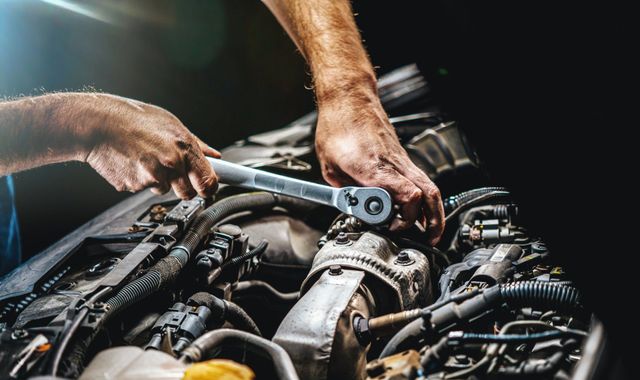All Categories
Featured

Modern cars are outfitted with sophisticated engine control devices (ECUs) that monitor and control numerous elements of the engine. These systems can discover problems before they come to be visible to the driver, which is where engine diagnostics enter into play. Engine diagnostics is an effective device that permits technicians to recognize concerns early, aiding stop significant repairs and making certain the durability of your automobile. Below's how engine diagnostics job and why they are necessary for maintaining your automobile's health and wellness.
- What Are Engine Diagnostics? Engine diagnostics refer to the procedure of making use of specialized devices to check and analyze the efficiency of a vehicle's engine. The diagnostic system within an automobile gathers information from sensing units situated throughout the engine and other vital parts, such as the exhaust, fuel, and transmission system. This information is after that processed by the vehicle's onboard computer, which can detect malfunctions or irregularities.
Auto mechanics can attach an analysis tool, commonly an OBD-II (Onboard Diagnostics) scanner, to your car's ECU to fetch error codes and real-time data. These codes show certain areas where the engine or other elements may be experiencing issues, also before advising lights or efficiency modifications are obvious to the chauffeur.
- Identifying Problems Early. Among the most considerable benefits of engine diagnostics is the ability to identify troubles early, commonly before they escalate into major issues. Tiny problems, such as a misfiring ignition system, a damaged sensing unit, or an inefficient fuel injector, can gradually intensify if left unchecked. With very early discovery via engine diagnostics, auto mechanics can deal with these minor problems before they create considerable damage.
As an example, if a sensing unit discovers that the engine is running also lean or rich (insufficient or excessive gas), this could cause enhanced endure engine parts or inadequate gas efficiency. By detecting this very early, the technician can adjust the air-fuel blend, avoiding expensive repairs later on.
- Preventing Engine Damages. Gradually, problems with the engine's elements, such as the timing belt, exhaust system, or cooling system, can lead to serious damage otherwise attended to quickly. A getting too hot engine due to a failing radiator or water pump can trigger considerable inner damages, such as distorted cyndrical tube heads or a blown gasket. Detecting issues early with the engine diagnostics system can avoid these situations from proceeding to catastrophic engine failing.
The diagnostic system can additionally find issues with the exhaust system, such as a malfunctioning catalytic converter, which might lead to inadequate engine performance and ultimate engine damages if not fixed.
- Minimizing Repair Work Prices. By recognizing and attending to minor problems early, engine diagnostics can save you significant cash on repair services. Fixings have a tendency to be less intricate and much more budget-friendly when troubles are caught early. Changing a faulty oxygen sensor or cleaning up a clogged up gas injector is fairly economical compared to replacing a whole engine due to neglect.
Additionally, engine diagnostics assist prevent unnecessary repair work by identifying the exact source of the issue. Without diagnostics, auto mechanics may need to do comprehensive screening and trial-and-error methods to diagnose the problem, which can boost both time and price.

- Improving Lorry Efficiency and Performance. One more advantage of normal engine diagnostics is that it helps enhance your car's performance and gas efficiency. If the engine is running efficiently and all systems are working efficiently, you will certainly experience much better acceleration, smoother driving, and enhanced gas economic situation. Engine diagnostics can disclose issues such as a clogged up air filter, a malfunctioning mass air flow sensor, or a damaged ignition system that might impede your vehicle's performance.
As an example, a malfunctioning thermostat could trigger your engine to overheat or not reach its perfect operating temperature level. A diagnostic check will certainly assist recognize this issue early, avoiding overheating and guaranteeing your lorry runs at its best.
- Why Routine Diagnostics Matter. While many drivers may think about engine diagnostics as something to do only when the "check engine" light shows up, normal diagnostics should be component of regular lorry upkeep. Several car fixing stores and car dealerships offer diagnostic checks as part of a yearly service or tune-up. Normal diagnostic scans aid catch issues prior to they trigger noticeable signs and symptoms or failures, ultimately avoiding significant repair work down the road.
It is likewise worth keeping in mind that if you're planning to offer or trade-in your automobile, having a current engine diagnostic report can be helpful. Prospective buyers or car dealerships might be much more likely to use a greater trade-in value or acquisition cost if they understand the car has actually been well-kept and cost-free of major engine problems.
- Verdict. Engine diagnostics play an essential function in maintaining your car running successfully and avoiding costly repair work. By determining concerns early, avoiding engine damages, minimizing repair work costs, and enhancing performance, engine diagnostics ensure your car stays trustworthy for many years ahead. Regular diagnostic checks as part of your lorry's regular maintenance will assist you catch small issues before they become significant repair services, giving you satisfaction when driving and securing your investment.
Latest Posts
Discovering the Benefits of WyHy Share Interest-bearing Account
Published Apr 19, 25
1 min read
Top-Quality Auto Care for All Cars & Trucks: Your Premier Auto Service in Montclare
Published Apr 19, 25
2 min read
Contact Us: Reach Out for Expert Auto Repair & Service in Montclare
Published Apr 19, 25
2 min read
More
Latest Posts
Discovering the Benefits of WyHy Share Interest-bearing Account
Published Apr 19, 25
1 min read
Top-Quality Auto Care for All Cars & Trucks: Your Premier Auto Service in Montclare
Published Apr 19, 25
2 min read
Contact Us: Reach Out for Expert Auto Repair & Service in Montclare
Published Apr 19, 25
2 min read